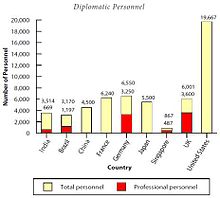- Diplomat
-
For other uses, see Diplomat (disambiguation).
A diplomat is a person appointed by a state to conduct diplomacy with another state or international organization. The main functions of diplomats revolve around the representation and protection of the interests and nationals of the sending state, as well as the promotion of information and friendly relations.
Diplomats are the oldest form of any of the foreign policy institutions of the state, predating by centuries foreign ministries, foreign ministers and ministerial offices.
Contents
Terminology
Main article: Diplomatic rankThe ranks of diplomats— ambassador, envoys, ministers, and chargé d’affaires — are determined by international law, namely the Vienna Convention on Diplomatic Relations of 1961.
Diplomats can be contrasted with consuls, attachés, who represent their state in a number of administrative ways, but who don’t have the diplomat’s political functions.
Function
Diplomats in posts collect and report information that could affect national interests, often with advice about how the home country government should respond. Then, once any policy response has been decided in the home country's capital, posts bear major responsibility for implementing it. Diplomats have the job of conveying, in the most persuasive way possible, the views of the home government to the governments to which they are accredited and, in doing so, to try to convince those governments to act in ways that suit home country interests. In this way, diplomats are part of the beginning and the end of each loop in the continuous process through which foreign policy is made.
In general, it has become harder for diplomats to act autonomously. Whereas in the past Thomas Jefferson could write to his Secretary of State, "We have not heard from our Ambassador in Spain for two years. If we do not hear from him this year, let us write him a letter",[1] secure communication systems, emails and mobile telephones can track down and instruct the most reclusive head of mission. The same technology in reverse gives diplomats the capacity for more immediate input about the policy-making processes in the home capital.
Secure email has transformed the contact between diplomats and the ministry. It is less likely to be leaked, and enables more personal contact than the formal cablegram, with its wide distribution and impersonal style.
Reporting
Advocacy
The home country will usually send instructions to a diplomatic post on what foreign policy goals to pursue, but decisions on tactics - who needs to be influenced, what will best persuade them, who are potential allies and adversaries, and how it can be done - are for the diplomats overseas to make.
In this operation, the intelligence, integrity, cultural understanding and energy of individual diplomats are critical. If they are any good at their jobs, they will have developed relationships grounded in trust and mutual understanding with influential members of the country in which they are accredited. They will have worked hard to understand the motives, thought patterns and culture of the other side.
Negotiation
The diplomat should be an excellent negotiator but, above all, a catalyst for peace and understanding between peoples. The role is the principal element in the peaceful relations between states because its scope ends when the fighting starts war and could, at best, act simultaneously.
Training
Most diplomats have university degrees in international relations, political science, economics, or law.[2]
Status and public image
Diplomats have generally been considered members of an exclusive and prestigious profession. The public image of diplomats has been described as "a caricature of pinstriped men gliding their way around a never-ending global cocktail party"[3] J. W. Burton has noted that "despite the absence of any specific professional training, diplomacy has a high professional status, due perhaps to a degree of secrecy and mystery that its practitioners self-consciously promote."[4] The state supports the high status, privileges and self-esteem of its diplomats in order to support its own international status and position.
The high regard for diplomats is also due to most countries' conspicuous selection of diplomats, with regard to their professionality and ability to behave according to a certain etiquette, in order to effectively promote their interests. Also, international law grants diplomats extensive privileges and immunities, which further distinguished the diplomat from the status of an ordinary citizen.
Psychology
While posted overseas, there is a danger that diplomats may become disconnected from their own country and culture. Sir Harold Nicolson acknowledged that diplomats can become "denationalised, internationalised and therefore dehydrated, an elegant empty husk".[5]
Uniform
Main article: Diplomatic uniformFrom about 1800 to after the Second World War, diplomats from most countries wore official uniforms at public occasions. Such uniforms are now retained by only a few diplomatic services, and are seldom worn.
References
- ^ Quoted in Abba Eban, Diplomacy for the Next Century (New Heaven, CT: Yale University Press, 1998) at 92.
- ^ Stuart Seldowitz, "The Psychology of Diplomatic Conflict Resolution," in H. J. Langholtz and C. E.Stout, Eds. The Psychology of Diplomacy (Westport: Praeger, 2004), pp. 47–58.
- ^ Allan Gyngell and Michael Wesley, Making Australian Foreign Policy (Cambridge: Cambridge University Press, 2003), pp. 106.
- ^ J. W. Burton, Systems, States, Diplomacy and Rules (Cambridge: Cambridge University Press, 1968), p. 206.
- ^ Harold Nicolson, The Evolution of Diplomacy (New York: Collier, 1962) at 107.
Categories:- Diplomacy
- Foreign policy
- Diplomats
Wikimedia Foundation. 2010.

